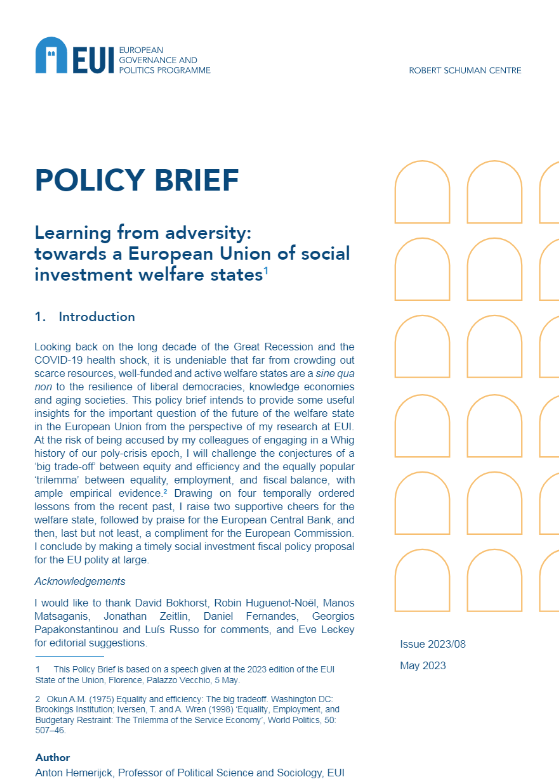
Resumen:Si echamos la vista atrás a la larga década de la Gran Recesión y al choque sanitario COVID-19, es innegable que, lejos de desplazar los escasos recursos, unos Estados del bienestar bien financiados y activos son una condición sine qua non para la resiliencia de las democracias liberales, las economías del conocimiento y las sociedades que envejecen. Este informe pretende aportar algunas ideas útiles sobre la importante cuestión del futuro del Estado del bienestar en la Unión Europea desde la perspectiva de mi investigación en el EUI. A riesgo de que mis colegas me acusen de participar en una historia whig de nuestra época de policrisis, cuestionaré las conjeturas de un "gran compromiso" entre equidad y eficiencia y el igualmente popular "trilema" entre igualdad, empleo y equilibrio fiscal, con abundantes pruebas empíricas. Basándome en cuatro lecciones del pasado reciente ordenadas temporalmente, lanzaré dos hurras de apoyo al Estado del bienestar, seguidos de elogios al Banco Central Europeo y, por último, pero no por ello menos importante, un elogio a la Comisión Europea. Concluyo haciendo una oportuna propuesta de política fiscal de inversión social para la política de la UE en general.
Summary:Looking back on the long decade of the Great Recession and the COVID-19 health shock, it is undeniable that far from crowding out scarce resources, well-funded and active welfare states are a sine qua non to the resilience of liberal democracies, knowledge economies and aging societies. This policy brief intends to provide some useful insights for the important question of the future of the welfare state in the European Union from the perspective of my research at EUI. At the risk of being accused by my colleagues of engaging in a Whig history of our poly-crisis epoch, I will challenge the conjectures of a ‘big trade-off’ between equity and efficiency and the equally popular ‘trilemma’ between equality, employment, and fiscal balance, with ample empirical evidence. Drawing on four temporally ordered lessons from the recent past, I raise two supportive cheers for the welfare state, followed by praise for the European Central Bank, and then, last but not least, a compliment for the European Commission. I conclude by making a timely social investment fiscal policy proposal for the EU polity at large.
Fecha publicación: 2023
Autor: Instituto Universitario Europeo; Hemerijck, Anton
ISBN / ISSN: 978-92-9466-367-2 / 2467-4540
Link: https://n9.cl/5p9j5
Palabras clave: ayuda social , desigualdad social , Estado del bienestar , Estado miembro UE , pobreza , política social europea
Keywords: social assistance , social inequality , welfare state , welfare state , EU member state , poverty , european social policy
